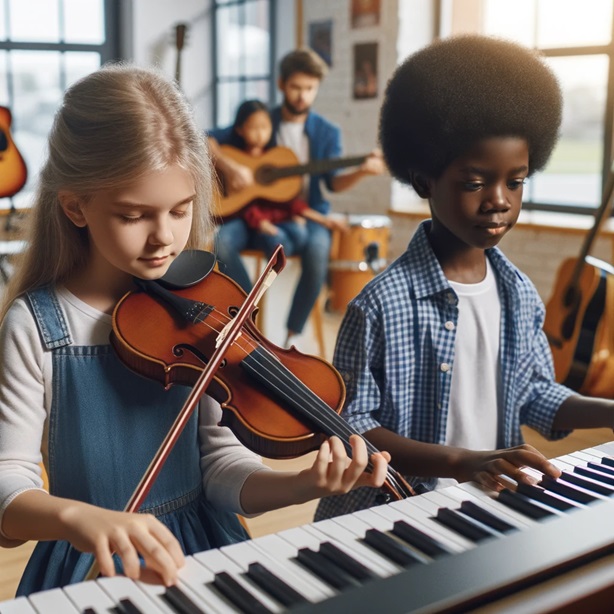Introduction
Engaging in musical education by learning to play an instrument is not merely a creative or leisurely pursuit but a profound cognitive enhancer. This multifaceted training goes beyond simple recreation, deeply impacting cognitive development and brain function across various domains, including memory enhancement, sensory coordination, and complex problem-solving abilities. The process of learning and playing music stimulates multiple brain areas, fostering neural plasticity and increasing mental agility.
Moreover, musical education has been shown to impact emotional and social development positively. Through music, individuals can express their emotions, communicate with others, and develop a sense of community and belonging. This holistic impact makes musical education a valuable tool for enhancing cognitive, emotional, and social well-being, contributing to overall mental health and quality of life.
Enhancing Memory and Concentration
The act of playing music involves a dynamic and continuous process of reading, interpreting, and converting notes and rhythms into coordinated motor actions. This complex activity significantly bolsters both auditory and visual memory systems. Musicians often develop remarkable memory capabilities, not just in remembering music but in other cognitive functions as well, which translates into enhanced academic performance and professional skills. The repetitive practice of music pieces requires acute concentration, thus improving prolonged attention and the ability to focus in high-demand settings.
Additionally, musical training enhances working memory, which is crucial for holding and manipulating information. This improvement in working memory contributes to better problem-solving abilities, enhanced learning, and improved academic and professional performance. Furthermore, the concentration required during musical practice enhances attentional control, helping individuals focus on relevant information and ignore distractions, which is beneficial for cognitive performance and daily functioning.
Boosting Problem-Solving Skills and Creativity
Music is inherently creative, and learning it enhances one's ability to think innovatively and adaptively. Musicians regularly engage in improvisation and composition, processes that require active problem-solving and the generation of new ideas within and beyond musical constructs. These activities encourage a musician to think outside the box and develop solutions that are not immediately obvious, skills that are highly prized in professional and academic environments. Moreover, the ability to translate complex musical theory into practice further sharpens analytical skills and enhances cognitive flexibility.
Engaging in musical creativity, such as improvising or composing, stimulates divergent thinking and fosters cognitive flexibility. This creative process enhances problem-solving abilities by encouraging individuals to explore multiple solutions, adapt to changing situations, and think innovatively. These skills are crucial for success in dynamic and unpredictable environments, making musical training a valuable tool for enhancing cognitive flexibility and adaptability.
Improving Coordination and Motor Skills
Mastering a musical instrument demands refined hand-eye coordination and dexterity. Musicians must develop the ability to execute precise movements with their fingers, hands, and possibly even feet, which greatly enhances fine motor skills and overall bodily coordination. This level of physical control is achieved through strengthening neural pathways associated with motor function, which can improve performance in other areas requiring fine motor control, such as typing or precision work in various crafts and professions.
Additionally, musical training enhances bimanual coordination, as many instruments require simultaneous use of both hands to play different notes or rhythms. This coordinated movement improves motor planning, precision, and control, which are valuable skills for various physical and cognitive tasks. Furthermore, musical training enhances spatial awareness and proprioception, helping individuals understand and control their body's position and movement, which contributes to improved physical coordination and performance.
Social and Emotional Benefits
Participating in musical groups such as bands, orchestras, or ensembles provides valuable social interaction that can lead to improved emotional intelligence. These collaborative environments demand communication, teamwork, and empathy as musicians synchronize with one another, fostering social cohesion and emotional maturity. The shared experiences and collective achievement in such settings contribute to building confidence and social skills, while also providing emotional support and developing resilience against stress and anxiety.
Musical training also enhances emotional expression and regulation, as individuals use music to express and process their emotions. This emotional outlet is particularly beneficial for mental health, as it provides a healthy means of coping with stress and emotional challenges. Additionally, musical participation fosters a sense of belonging and community, which is crucial for social support and well-being.
Long-Term Benefits to Overall Brain Health
Engagement in musical activities has been consistently linked with reduced rates of cognitive decline in older adults. Research indicates that those who have spent a lifetime playing musical instruments are significantly less prone to develop neurodegenerative disorders such as Alzheimer's disease and other forms of dementia. The cognitive reserve built through years of musical training provides a protective effect, maintaining brain function and delaying the onset of cognitive impairments.
Musical training enhances neuroplasticity, the brain's ability to adapt and change, which contributes to cognitive resilience and protects against age-related cognitive decline. This neuroplasticity is associated with enhanced cognitive function, improved memory, and better executive function, all of which contribute to overall brain health and cognitive longevity. Furthermore, musical participation promotes mental stimulation, social interaction, and emotional well-being, all of which are crucial factors for maintaining cognitive health and preventing cognitive decline.
Conclusion
The myriad cognitive benefits of learning to play musical instruments underscore their value not just as artistic pursuits but as significant enhancers of mental function and health. The skills acquired through musical training permeate various aspects of life, contributing to enhanced problem-solving capabilities, improved memory, and better emotional and social abilities. Engaging with music provides a robust foundation for cognitive growth and lifelong learning, making it a beneficial endeavor for individuals of any age.
By engaging in musical education, individuals can enhance their cognitive, emotional, and social well-being, contributing to overall mental health and quality of life. Whether as a hobby, a profession, or a therapeutic tool, musical training offers valuable benefits for cognitive enhancement and personal development, making it a worthwhile investment for lifelong health and happiness.
